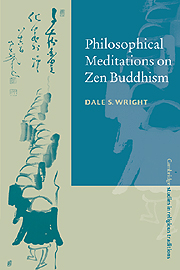Book contents
- Frontmatter
- Contents
- Introduction
- 1 TEXTUALITY: the “dependent origination” of Huang Po
- 2 READING: the practice of insight
- 3 UNDERSTANDING: the context of enlightenment
- 4 LANGUAGE: the sphere of immediacy
- 5 RHETORIC: the instrument of mediation
- 6 HISTORY: the genealogy of mind
- 7 FREEDOM: the practice of constraint
- 8 TRANSCENDENCE: “going beyond” Huang Po
- 9 MIND: the “Great Matter” of Zen
- 10 ENLIGHTENMENT: the awakening of mind
- CONCLUSION: Zen in theory and practice
- Bibliography
- Index
10 - ENLIGHTENMENT: the awakening of mind
Published online by Cambridge University Press: 12 November 2009
- Frontmatter
- Contents
- Introduction
- 1 TEXTUALITY: the “dependent origination” of Huang Po
- 2 READING: the practice of insight
- 3 UNDERSTANDING: the context of enlightenment
- 4 LANGUAGE: the sphere of immediacy
- 5 RHETORIC: the instrument of mediation
- 6 HISTORY: the genealogy of mind
- 7 FREEDOM: the practice of constraint
- 8 TRANSCENDENCE: “going beyond” Huang Po
- 9 MIND: the “Great Matter” of Zen
- 10 ENLIGHTENMENT: the awakening of mind
- CONCLUSION: Zen in theory and practice
- Bibliography
- Index
Summary
Do not say that Huang Po's enlightenment is incomplete. How can someone like Joko tell what level Huang Po has reached or what his words mean? Huang Po is an ancient Buddha and he sacrificed his life for the transmission of the dharma.
DogenWhat is enlightenment?
Immanuel KantFollowing the literary custom adopted in the nineteenth century, John Blofeld drew upon the European word “enlightenment” to translate the highest goal of Zen Buddhism. In actual fact, however, among the most widely employed symbols for the goal of Zen used in the Huang Po literature, none could be translated literally by our word “enlightenment.” Why, then, did Blofeld opt for this word rather than simply translating the symbols that were to be found in the texts? One reason would clearly be that the precedent for this rendering had already been firmly established. Earlier translators, including D. T. Suzuki, had interpreted both Buddhism and its particular “Zen” form as traditions focused on the quest for “enlightenment.” This answer, however, simply forestalls our question: why had they chosen the word “enlightenment” as the most general rendering of an array of terms for the goal of spiritual practice in Buddhism? No doubt they would have responded to our question with the simple claim that “accuracy” was the primary criterion of selection, not necessarily “literalness” of translation but overall correspondence to the authentic meanings being transmitted. “Correspondence,” however, is two-dimensional. It entails an understanding of two vocabularies, two contexts of meaning, and two evolving traditions – one for the tradition out of which a meaning will be taken and one for the tradition into which it will be placed.
- Type
- Chapter
- Information
- Philosophical Meditations on Zen Buddhism , pp. 181 - 206Publisher: Cambridge University PressPrint publication year: 1998



